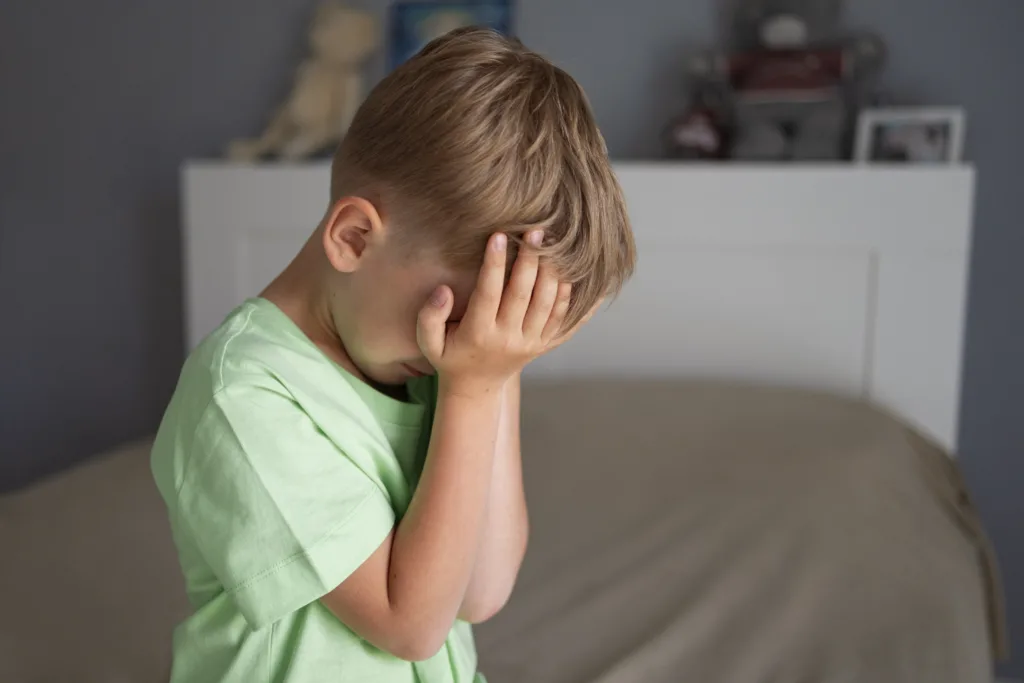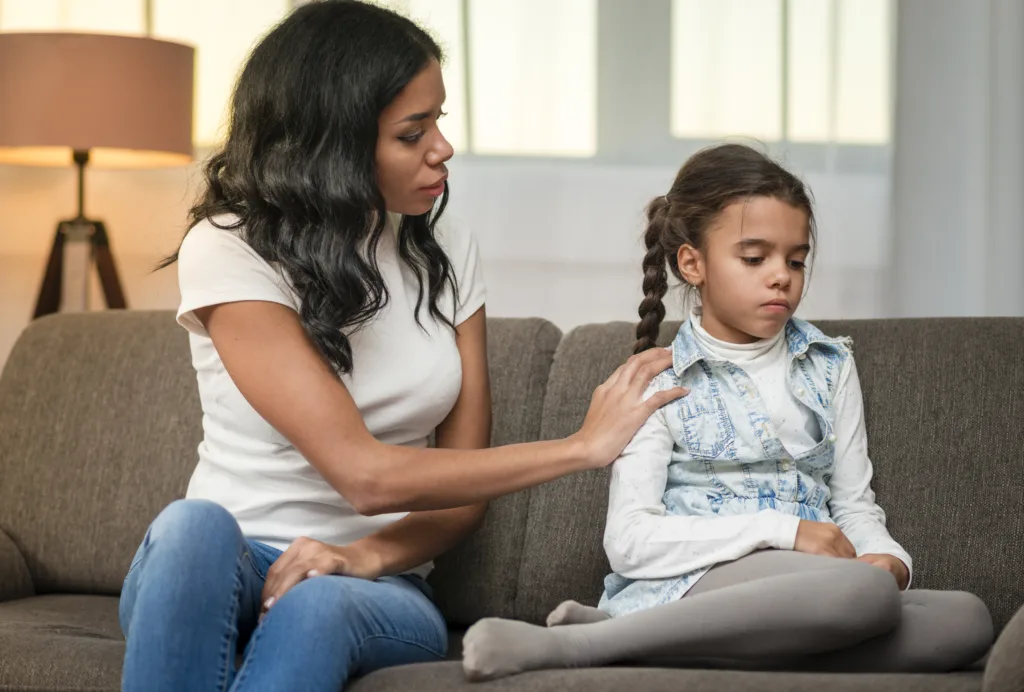Anger management for kids is more than just a parenting buzzword; it’s a crucial aspect of guiding children to healthy emotional development. Unchecked, unmanaged anger can have a significant impact on a child’s well-being, leading to problems in social interactions, school performance, and overall mental health. The importance of addressing anger management in children cannot be overstated, as early intervention can shape positive behaviors that last a lifetime. Read further about scientific techniques that parents and caregivers can use as effective tools to help children understand and control their anger.
Helping Your Child Navigate Emotions
Emotional intelligence is an essential component of anger management for kids and plays a crucial role in helping them express and deal with their anger. Children with higher emotional intelligence are often able to put their feelings into words and seek solutions rather than act out in destructive ways. This ability is nurtured within positive family dynamics, where parents actively teach their children valuable coping strategies.
At the same time, emotional intelligence goes beyond self-control; it includes social awareness – the ability to understand and empathize with others’ feelings. This understanding fosters compassion and better social interaction. Conversely, a lack of emotion regulation skills can lead to constant tantrums and anger outbursts, straining relationships within the family and creating a negative atmosphere.
Introducing anger management strategies, such as encouraging open communication, setting clear boundaries, and modeling appropriate behavior, can make a significant difference.
Why are Kids so Angry?
Anger management for kids begins with recognizing the root causes of their tantrums and outbursts. Although children’s lives may seem carefree and simple, filled with play and learning, they can experience just as much stress as adults.

Credit: Freepik
Grown-up responsibilities might appear more significant, but a child’s day at school, teachers, peers, and maybe some teasing from the big kids can be just as taxing. When they arrive home, their stress level might be sky-high, similar to a tough day at the office for us.
👉 Discover more about the reasons behind your child’s anger in our article ‘Top Causes for Child’s Anger and Effective Solutions for Parents.‘
Anger at Various Child Development Stages
Depending on their age and stage of brain development, kids respond to upsetting stimuli differently.
- Infants (0-12 months): In the earliest stages of life, babies express anger through crying and fussiness. These are instinctive, natural responses they use when feeling hungry, being in pain, or getting too much stimulation like noise or lights.
- Toddlers (1-3 years): As children enter the toddler years, anger often becomes a response to frustration over their inability to communicate or achieve a goal. Common expressions of this anger include not cooperating, hitting, biting, kicking, throwing objects, or flailing on the floor.
- Preschool age (3-5 years): At the preschool stage, children’s cognitive abilities grow, allowing them to better understand and label their feelings. However, impulse control is still developing, so anger may be expressed through physical aggression, like hitting or hurtful words.
- School age (6-12 years): Once kids start going to school, they face new challenges with friends and peers from school. They’re getting better at using words to talk about how they feel, but they might still have a hard time handling strong emotions the right way. Some might become withdrawn, trying to repress anger, while others may turn into defenders of justice and act out every time negative emotions bring tension to their bodies.
- Adolescence (13-18 years): During adolescence, teens experience big changes in their brains and bodies, leading to complex emotions, especially anger. They understand rules, and they have better reasoning skills. However, the quest for forming an identity might make them challenge their parent’s beliefs or plans for their future. Mood swings may be common. Anger might turn inward, presenting itself in episodes of self-harm or showing up as rebellion.
Effective Anger Management for Kids
Acknowledging that anger is a normal response to certain situations is only the first step in helping children manage the tension it brings to their bodies. What comes next is recognizing the importance of finding the techniques of anger management for kids that best fit their needs. Some children may need assistance to calm down, while others will need space to self-regulate by themselves.

Credit: Freepik
For example, a child may find comfort in a gentle hug or soothing words, while another may prefer time alone in a quiet room to gather their thoughts. Some children may benefit from creative outlets like drawing or playing with clay to express their feelings, while others might find physical activities like running or jumping helpful in releasing pent-up energy.
Paying close attention to what triggers anger in your child and introducing different anger management activities for kids at an early age can ensure healthy emotional development. For younger children, enhancing communication skills and emotional vocabulary is vital. Teaching them to talk things out rather than act impulsively can significantly benefit their relationships with others.
As children grow into adolescence, they should become equipped with coping skills to handle stressful or challenging situations. By practicing techniques such as deep breathing, maintaining open communication, or seeking support from trusted adults, they can manage their emotions more effectively.
Developing Anger Management Skills
If not managed properly, anger can turn into aggression, which is a negative and often harmful expression of this powerful emotion. Here are a few regulation strategies that can help children manage their anger in a healthy way:
- Quick but calm responses: When a young child shows aggressive behavior, such as hitting a playmate who has taken a toy, immediate but calm intervention is key. A hurried or angry reaction from an adult might frighten or confuse the child, making it more challenging for them to absorb the lesson.
- Provide the language: Younger children may not have the vocabulary to express their feelings accurately. Provide them with the words they need. If a child is upset because a friend took a toy, you might say, “It looks like you’re feeling angry because your friend has your toy. Is that right?”
- Show them how to talk things out: Teaching children to talk things out is more than just a way to manage anger; it’s a core skill that can lead to greater empathy, deeper relationships, and a more profound understanding of themselves and others. Imagine two children fighting over a video game controller. Rather than stepping in and deciding who gets to play, a caregiver might guide the children through a conversation: “Can you each tell me why you want to play right now? Let’s listen to each other and find a way to share.”
- Teach them to share and socialize: Children’s disagreements over possessions are good opportunities for a parent or caregiver to step in and demonstrate sharing. They might say, “I see that you both want the same thing. How about taking turns? You can use it for a little while, and then it’s your friend’s turn.” Encourage children to work together on a project, play a team game, or even just engage in parallel play where they are doing similar activities side by side. Praising positive interactions reinforces this behavior: “I love how you two are working together on that puzzle! Great teamwork!”
- Avoid overstimulation: After a busy day filled with play, learning activities, and social interaction, a child might become overwhelmed and act out due to built-up angry feelings. They might snatch a toy from a sibling or even lash out physically. If a child starts to become more irritable, restless, or aggressive, it might be a sign of overstimulation. Look for changes in behavior that might signal that they need a break.
Coping Mechanisms: Anger Management Activities for Kids
Any strategy that will help children to stop and think before they act will benefit their social development long term. Anger management for kids is best taught when the child is calm and capable of taking in the lesson. This is why it’s best to keep the “fancy” talk about logic and other people’s feelings for the most peaceful parts of their daily routine. Art, play and mindfulness exercises are great ways to help your steamy little dragon to use their flame constructively and not to take their anger out on others.
Art and Play Therapy
Art and play offer children ways to express their emotions creatively, which can be a significant factor in preventing angry outbursts. A recent study has highlighted the power of therapy through art in promoting children’s mental health and well-being. Art and play therapy can be vital tools in enhancing their anger management skills by fostering self-expression, safety, empowerment, hope, and optimism for the future.

Credit: Freepik
Through creative activities like drawing, painting, or engaging in imaginative play, children can communicate emotions that might be difficult to express through words alone. These are efficient anger management activities for kids. This form of self-expression helps children feel understood and validated, reducing feelings of frustration or anger.
For example, a child who struggles with verbal communication might find solace in painting or drawing, turning their feelings into visual art. Similarly, engaging in playful activities like building with blocks or putting on a puppet show could provide a sense of control and empowerment.
By tapping into their creative sides, children learn about their emotions and find healthier ways to express anger. They also develop essential life skills like communication, problem-solving, empathy, and resilience.
Mindfulness for Kids

Credit: Freepik
Mindfulness for kids is a vital practice that can help them become more in tune with their thoughts, feelings, and bodies. Teaching children to be present and self-aware promotes emotional regulation, particularly in managing feelings of anger, stress, and frustration. It is a skill that can be introduced and developed from an early age and has applications that grow with the child into adulthood. Here’s a list of mindfulness exercises that are great in anger management for kids:
- Body Scan: Guide children to notice different parts of their bodies, from their toes to their heads, and to pay attention to any sensations they feel. This helps them become more aware of their physical sensations and how they connect with their emotions.
- Listening to Sounds: Have children close their eyes and pay attention to the sounds around them. It helps them to focus on the present moment and develops their ability to concentrate.
- Nature Walks: Taking a walk in nature and encouraging children to notice the sights, sounds, and smells around them is a wonderful way to practice mindfulness.
- Mindful Storytelling: Reading or telling a story with an emphasis on emotional content can help children connect with their feelings and understand others’ emotions.
- Guided Visualization: Lead children through a guided visualization exercise, encouraging them to imagine a calming scene, such as a beach or forest. This is great, especially for older children who have longer attention spans. It can be a powerful way to reduce anxiety and stress.
- Yoga: Incorporating simple yoga poses and focusing on the breath can engage both the body and mind. Yoga helps to center children and brings their attention to the present moment.
These exercises can be tailored to the needs and interests of individual children, encouraging them to connect with themselves and the world around them in meaningful ways.
👉 Ready to be a super parent? Learn how to help your child make better choices and be resilient! Check out our article ‘Raising Strong Kids: Stop Impulsive Behavior’ for techniques that really work.
Persistent Anger Problems and Professional Support
If a child’s anger issues continue despite trying various strategies at home or in school, it might be time to seek professional help such as counseling or therapy. Therapists who specialize in pediatric care are trained to work specifically with children and can perform a comprehensive evaluation to understand the root causes of the anger. These causes might be tied to mental health challenges, unassimilated social skills, or other underlying issues that aren’t immediately apparent and make anger management for kids difficult.

Credit: Freepik
Cognitive Behavioral Therapy (CBT) is a widely-used psychological treatment method that focuses on helping people of all ages understand and change their thoughts and behaviors. Unlike some other therapy approaches, CBT is often more focused on the present and practical problem-solving. CBT has shown significant success in helping with anger management for kids. By working with a therapist, children can learn to understand their thought patterns, recognize when they are becoming angry, and develop strategies to respond positively. Cognitive Behavioral Therapy is especially useful for children having a hard time with ongoing anger issues that might be affecting their daily life and relationships.
Conclusion
Paying close attention to what triggers anger in your child and experimenting with different anger management activities for kids at an early age helps in crafting a personalized approach, ensuring healthy emotional development. Through intentional approaches and education, such as modeling appropriate behavior and investing in practices like mindfulness or art therapy, children can be equipped with the skills they need to navigate their emotions.
Whether it’s a sibling dispute over a toy or frustration with a difficult homework assignment, some tailored strategies can become invaluable tools in a child’s emotional toolkit, helping them navigate life’s challenges with resilience and empathy. By seeking pediatric professional help when necessary, parents can provide the support and guidance their children need to learn to manage their anger effectively.
Are you struggling with your own anger, finding it hard to model healthy coping for your kids? Join our parenting class, “How to Stop Shouting at Your Kids.” We’ll help you understand and manage both your own anger and your children’s emotions. Learn practical, proven strategies to communicate calmly and effectively. Transform your family dynamics by fostering patience and empathy. Sign up today, and take the first step towards a more peaceful home!
Need instant parenting advice? Meet Sophie, our AI assistant, ready to answer your questions and guide you through parenting challenges. Connect with Sophie now and make parenting a breeze!
References
Cabello, R., & J., M. (2017). Parental Education and Aggressive Behavior in Children: A Moderated-Mediation Model for Inhibitory Control and Gender. Frontiers in Psychology, 8, 272862. https://doi.org/10.3389/fpsyg.2017.01181
Halder, S., & Mahato, A. K. (2019). Cognitive Behavior Therapy for Children and Adolescents: Challenges and Gaps in Practice. Indian Journal of Psychological Medicine, 41(3), 279-283. https://doi.org/10.4103/IJPSYM.IJPSYM_470_18
Hansenne, M., & Legrand, J. (2012). Creativity, emotional intelligence, and school performance in children. International Journal of Educational Research, 53, 264-268. https://doi.org/10.1016/j.ijer.2012.03.015
Liu, C., Moore, G. A., Beekman, C., Pérez-Edgar, K. E., Leve, L. D., Shaw, D. S., Ganiban, J. M., Natsuaki, M. N., Reiss, D., & Neiderhiser, J. M. (2018). Developmental Patterns of Anger from Infancy to Middle Childhood Predict Problem Behaviors at Age 8. Developmental psychology, 54(11), 2090. https://doi.org/10.1037/dev0000589
Mavroveli, S., Petrides, K.V., Shove, C. & Whitehead, A. (2018). Investigation of the construct of trait emotional intelligence in children. European Child & Adolescent Psychiatry, 17, 516–526 (2008). https://doi.org/10.1007/s00787-008-0696-6
Mitrofan, O., Paul, M., Weich, S. & Spencer, N. (2014). Aggression in children with behavioural/emotional difficulties: seeing aggression on television and video games. BMC Psychiatry, 14. 287. https://doi.org/10.1186/s12888-014-0287-7
Moula, Z., Powell, J., & Karkou, V. (2022). Qualitative and Arts-Based Evidence from Children Participating in a Pilot Randomised Controlled Study of School-Based Arts Therapies. Children, 9(6). https://doi.org/10.3390/children9060890
Sukhodolsky, D. G., Smith, S. D., McCauley, S. A., Ibrahim, K., & Piasecka, J. B. (2016). Behavioral Interventions for Anger, Irritability, and Aggression in Children and Adolescents. Journal of Child and Adolescent Psychopharmacology, 26(1), 58-64. https://doi.org/10.1089/cap.2015.0120
Zaccaro, A., Piarulli, A., Laurino, M., Garbella, E., Menicucci, D., Neri, B., & Gemignani, A. (2018). How Breath-Control Can Change Your Life: A Systematic Review on Psycho-Physiological Correlates of Slow Breathing. Frontiers in Human Neuroscience, 12. https://doi.org/10.3389/fnhum.2018.00353









